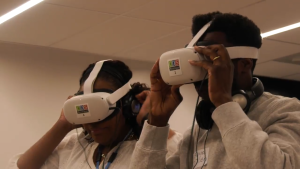Montreal Health Workers Utilize VR to Enhance Understanding of Patients with Dementia
In an effort to improve the quality of care for patients with dementia, health workers in Montreal have turned to virtual reality (VR) technology. This innovative approach allows healthcare professionals to better understand the experiences and needs of their patients, ultimately leading to more effective and compassionate care.
Dementia is a progressive brain disorder that affects millions of people worldwide. It can cause memory loss, confusion, and difficulty with daily tasks, making it challenging for healthcare workers to provide the best possible care. However, with the use of VR, health workers are gaining a deeper understanding of the condition and its impact on patients.
The VR program, developed by the University of Montreal’s Faculty of Nursing, allows healthcare workers to experience what it is like to live with dementia. By wearing a VR headset, they are transported into a virtual world where they can see and hear as a person with dementia would. This immersive experience helps them to empathize with their patients and better understand their behaviors and needs.
According to Dr. Véronique Provencher, a professor at the University of Montreal and one of the creators of the VR program, the goal is to “create a more human approach to care for people with dementia.” By using VR, health workers can see firsthand the challenges faced by their patients, such as difficulty with spatial awareness and sensory overload. This understanding allows them to tailor their care to meet the specific needs of each individual.
The VR program has been well-received by healthcare workers, with many reporting a significant increase in their empathy and understanding towards patients with dementia. It has also been beneficial for family members of those with dementia, as they can also experience the virtual world and gain a better understanding of their loved one’s condition.
This innovative use of VR technology has the potential to greatly improve the quality of care for patients with dementia. It not only allows healthcare workers to better understand the condition, but it also promotes a more compassionate and person-centered approach to care. As the program continues to be implemented in healthcare facilities across Montreal, it is hoped that it will lead to better outcomes for patients with dementia and their families.
In conclusion, the use of VR technology in healthcare is proving to be a valuable tool in enhancing understanding and empathy towards patients with dementia. By immersing themselves in a virtual world, health workers are gaining a deeper understanding of the condition and its impact on patients, ultimately leading to more effective and compassionate care. This innovative approach has the potential to greatly improve the lives of those living with dementia and their caregivers.




